Ælfgif-who? provides short biographies of early medieval English women. Click on the podcast player if you’d like to hear this newsletter read aloud in my appealing Yorkshire accent.
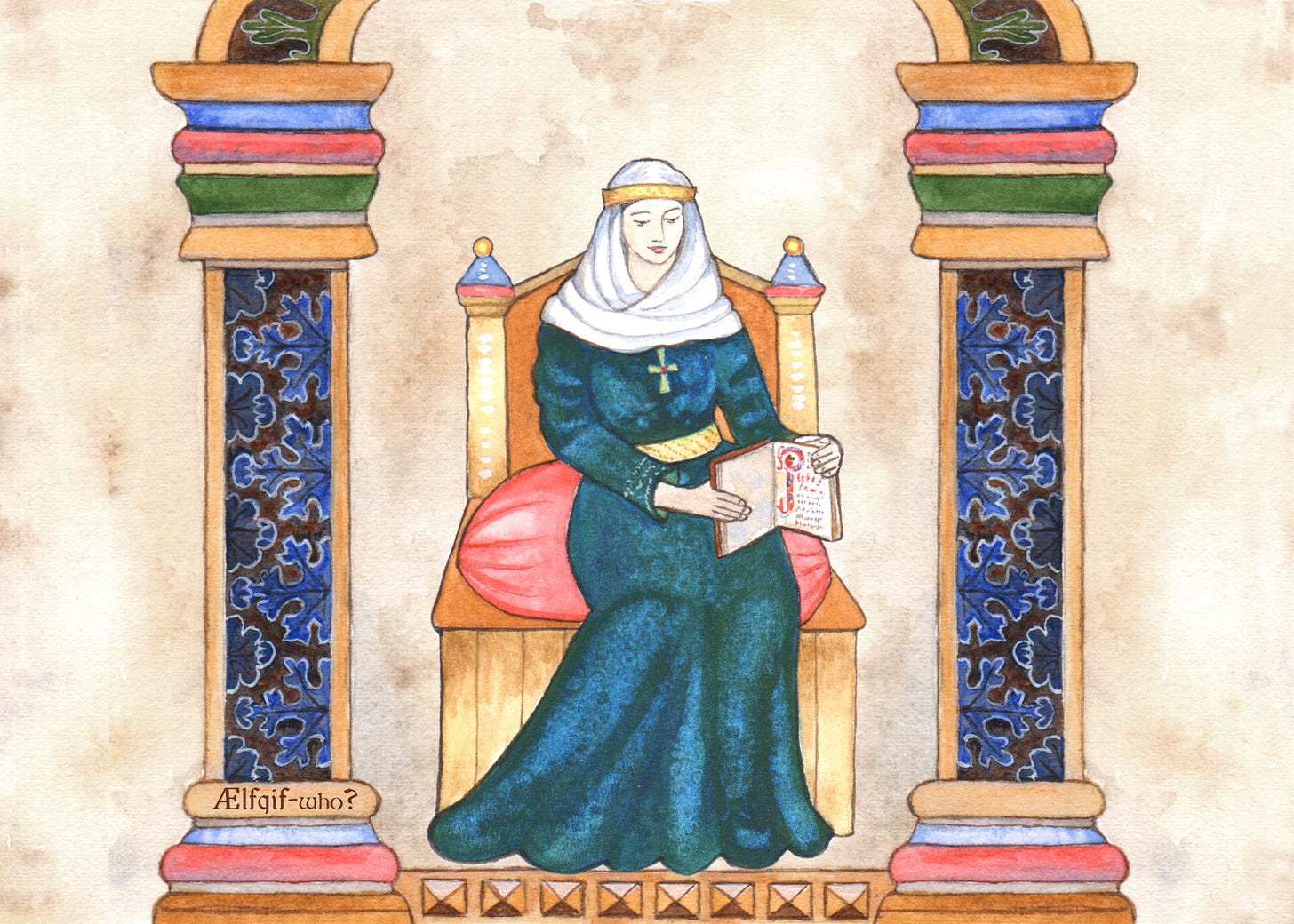
Osburh: When is a king’s wife not a queen?
Osburh, who lived in the first half of the ninth century, was the mother of one of the early medieval period’s most famous rulers: King Alfred of Wessex. Often known as ‘Alfred the Great’, her son is well known for fighting against Viking invaders. Osburh was married to Alfred’s father King Æthelwulf, and it’s assumed that she was also mother to his siblings, making her the mother of four successive West-Saxon kings. Despite being married to a king and bearing his royal children it is perhaps surprising that Osburh herself had no role in rulership, nor was she ever considered a ‘queen’. Her life is not well-documented - she is only mentioned in a single surviving early medieval source. With so little source material on Osburh, telling her life story is not possible, but we can recreate some of her biography with the information that survives.
The one surviving source that tells us about Osburh is actually a biography of her son Alfred, written by a Welsh monk named Asser at his court in 893, four decades after Osburh’s likely date of death. In this source what we have is a snapshot of Osburh from the perspective of someone who did not know her, but whose purpose in writing was to aggrandise her son.
From Asser’s Life of King Alfred we know that it was not the practice in the West-Saxon court to allow a queen to sit beside the king, or allow her to be called queen - instead she must be called ‘king’s wife’. This might explain why Osburh is not mentioned in any other sources. Asser tells us that this is because of the stigma one particular tyrannical queen of Wessex called Eadburh had brought upon the role a century ago, after she poisoned her husband and committed all sorts of debauchery. Despite this, Asser himself certainly thinks this custom for kings to have low-status wives is conspicuous, and he calls it ‘detestable’.
Asser briefly discusses Osburh directly twice. His first mention of her occurs in a section about Alfred’s family background.
Asser writes in his Life of King Alfred that:
Concerning his mother’s family, Alfred’s mother was called Osburh, a most religious woman, noble in character and noble by birth. She was the daughter of Oslac, King Æthelwulf’s famous butler. Oslac was a Goth by race, for he was descended from the Goths and Jutes, and in particular, from the line of Stuf and Wihtgar, two brothers - indeed, chieftains - who, having received authority over the Isle of Wight from their uncle King Cerdic and from Cynric his son (their cousin), killed the few British inhabitants of the island whom they could find on it...1
Aside from calling Osburh religious and noble, descriptors that might well reflect what Alfred himself said of his mother, there is little here in Asser’s writing that speaks to her actual life or character, concentrating instead on her genealogy.
Royal genealogies are not uncommon in early English sources, but maternal genealogies are rare. In fact, Osburh’s is the most detailed woman’s genealogy in any surviving source. Historian Alex Traves has argued recently that the inclusion of such a detailed snapshot of Osburh’s ancestry does not necessarily reflect her importance as an individual. It was included because emphasising her heritage helped secure Alfred’s rulership over areas that has been recently subsumed into his kingdom, most notably the Isle of Wight.2 So while we can view this anecdote as an acknowledgement of the importance of Alfred’s maternal family, we must also view it as a calculated appeal to Alfred’s ancestral right to rule over certain areas.
The other mention of Osburh in Asser’s Life of King Alfred is a much more personal story. Asser tells us that:
One day … when his mother was showing him and his brothers a book of English poetry which she held in her hand, she said: ‘I shall give this book to whichever one of you can learn it the fastest.’ Spurred on by these words, or rather by divine inspiration, and attracted by the beauty of the initial letter in the book, Alfred spoke as follows in reply to his mother, forestalling his brothers (ahead in years, though not in ability): ‘Will you really give this book to the one of us who can understand it the soonest and recite it to you?’ Whereupon, smiling with pleasure she reassured him, saying: ‘Yes, I will.’ He immediately took the book from her hand, went to his teacher and learnt it. When it was learnt, he took it back to his mother and recited it.3
This story paints the picture of a tender scene from Alfred’s childhood, in which Osburh is reading a book to her children, and encouraging them to learn to read. But again the main purpose of this anecdote is probably not to reveal much about Osburh herself, but to show how gifted Alfred was in learning, even in his very early life, and especially compared to his brothers. It is intended to foreshadow King Alfred’s later interest in a revival of education and vernacular literature.
However, what this also shows is that Osburh herself was likely an educated woman, and that royal mothers would have had a personal role in the education of their children. Whether or not this story is true, it is interesting that Asser thought it most appropriate to use a personal, maternal moment of a young boy relating to his mother to illustrate the intellect of the king.
This is unfortunately the extent of source material that mentions Osburh directly. She attested no charters, none of her letters survive, and she does not appear in contemporary annals such as those of the Anglo-Saxon Chronicles. Everything about her life must be surmised using information about the people around her.
We know from Asser that Osburh was Alfred’s mother, and as no record survives of King Æthelwulf having a wife before her, we might assume she was the mother of Alfred’s older siblings: he had at least four brothers and one sister. From this, we can calculate some rough dates for milestones in Osburh’s life. In 839 when Æthelwulf became king, his eldest son Æthelstan became sub-king of Kent. If we assume he was at least 15 when he became sub-king, that puts Osburh and Æthelwulf’s marriage to before 824. This means she was already of childbearing age when they married, and still of childbearing age when Alfred was born in around 849. Taking these approximations into account, she could feasibly have been age fifteen in 824 and age forty in 849, which would mean she was born around 809. We must remember this dating is only a possibility, and is reliant on her being mother to all of Alfred’s siblings, which is not a certain fact.
Her death date also has to be worked out from the historical context. From Asser’s Life of King Alfred we know that Osburh was still alive during Alfred’s early childhood in the 850s, but King Æthelwulf married his second wife Judith, a twelve year old Carolingian princess, in 856. Judith’s marriage to Æthelwulf was performed during a religious ceremony written by Hincmar, the Archbishop of Rheims. Given Hincmar’s very strict views on remarriage, we can be certain Osburh was dead by this point. It is worth noting that during this ceremony Judith was crowned and anointed the Queen of Wessex, due to her illustrious family - breaking West-Saxon custom by receiving an honour poor Osburh never enjoyed, even in spite of her own noble ancestry.
So here we have a possible outline of Osburh’s life but nothing more: she was born into a noble family, married a king, bore his royal children, taught them to read, and died in her forties when her youngest was still a young boy. She would never know that her husband went on to marry a twelve year old princess and give her the honour that he never allowed his first wife - perhaps for the best.
It is only because of Asser, writing decades later, perhaps acting on the wishes of Alfred himself, that Osburh’s name was ever entered into the historical record, along with something about her noble background, and a touching personal story.
Recommended Reading:
Alex Traves, ‘Genealogy and Royal Women in Asser’s Life of King Alfred: Politics, Prestige and Maternal Kinship in Early Medieval England’, Early Medieval Europe (2022)
Asser’s Life of King Alfred, ed. By Simon Keynes and Michael Lapidge (affiliate link)
Translated by Keynes, Simon; Lapidge, Michael (2004). Alfred the Great: Asser's Life of King Alfred and other contemporary sources. New York: Penguin Classics. p. 68
Life of King Alfred, p. 75






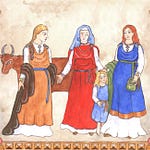
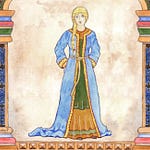
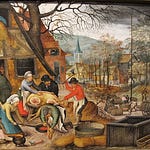
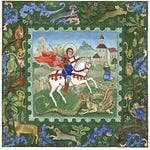



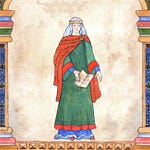
Share this post